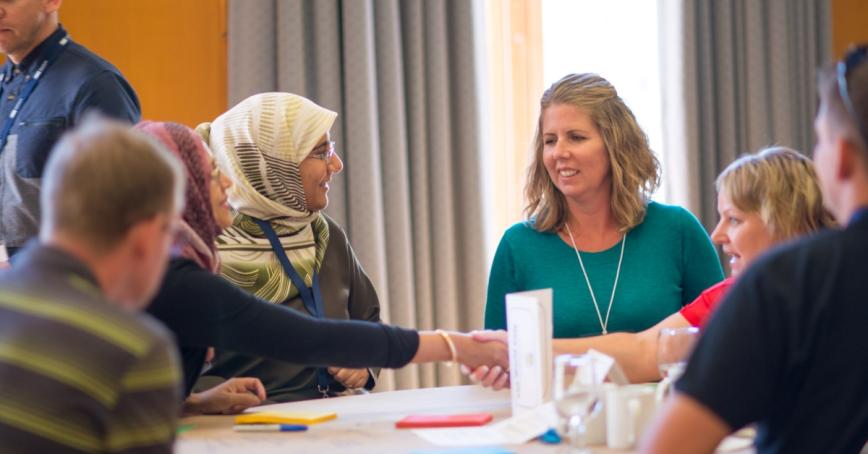Royal Roads develops changemaker micro-credential for universities

Learn about RRU Professional and Continuing Studies course offerings.
“A changemaker is a practical visionary: a person who sees persistent problems in the world and looks beyond symptoms. A changemaker knows the problem can’t be solved until they understand the root causes of why and how that problem keeps recurring; and they know they can’t solve the problem alone.” - Charmaine Lyn, Ashoka Canada
In a time of crisis — actually, multiple, overlapping crises, or polycrisis — how do you make change? And who is best equipped to do it?
For Ashoka Canada, which has been leading the changemaking movement for four decades, the answer can be found in its network of campuses, post-secondary institutions that have demonstrated a commitment to innovation both in what and how they teach, and how they’re run.
Royal Roads University is one such Changemaker Campus and, because of its history of innovation in the delivery and content of courses, Ashoka worked with RRU Professional and Continuing Studies to develop a micro-credential to bring on board another institution, University of the Fraser Valley (UFV), says Charmaine Lyn, director of Changemaker Education with Ashoka Canada.
Last fall, 20 UFV staff members — faculty, associate vice-presidents, directors, support staff, even a dean — took part in the in-person and remote sessions needed to achieve the micro-credential and, they hope, a Changemaker Campus designation for the university, which is headquartered in Abbotsford, B.C.
The goal, as described in a UFV blog in November 2023, was to “embed social innovation at the core of the institution’s values and practices,” with a focus on integrating “systems thinking, social innovation, equity, diversity and inclusion (EDI), experiential learning, and empathy throughout the university, ensuring that these values become an inherent part of UFV’s DNA.”
One key, the blog states, is that “UFV aims to create an educational environment that empowers students for meaningful, purpose-driven careers after graduation. This transition signifies a shift away from traditional models towards more community-focused, impact-oriented engagement.”
‘Changemaking is the future of education’
“There is no denying that changemaking is the future of education, of post-secondary education especially, and it is integral to the future of us having a thriving and vibrant society or community culture, certainly in our local areas but also globally,” says Samantha Hannah, an associate professor in UFV’s School of Communication who took part in the micro-credential.
For students, “this could be in the form of experiential learning brought into the classroom, it could be in the form of practicum, internship or special project out in the community,” she says, adding that students’ attitudes and perspectives are different from what they were even a decade ago.
“They see themselves as change agents, as people who need to change the world — not just want to, but need to. Because there’s the feeling that the fate of the planet, the health of our communities, our ecosystem and environment is more important than personal gain.”
Hannah notes that UFV, which is a teaching-focused institution, is already doing some of those things and says she hopes working toward a changemaker designation allows it to bring them under one umbrella.
Awneet Sivia, associate vice president, Teaching and Learning, at UFV, echoes that sentiment, noting work UFV students have done with Archway Community Services in Abbotsford or the university’s own Community Health and Social Innovation Hub.
“I hope students are going to see what they’re learning is a) applicable to their real world but b) that they are taught strategies, competencies, approaches and mindsets, and provided tools and allowed to practise those tools that allow them to change the status quo,” Sivia says.
“[School] is often the only space in a young person’s life where they are exposed to so many different ideas and so many different ways of thinking, so if they come out replicating what is and not doing anything else, then we’ve kind of given them half an education,” she adds.
‘What is important now in post-secondary education?’
Zoe MacLeod, RRU’s associate vice president, Professional and Continuing Studies, who helped design the program, says, “It was a privilege to witness the transformative journey of UFV staff in embracing changemaking through the Leading Social Impact in Post-Secondary Education micro-credential program.”
MacLeod, who helped build the program, adds: “Their commitment reflects a deep dedication to fostering innovation, equity and social impact in post-secondary education. This collaborative effort exemplifies the power of education to shape not just careers, but purpose-driven lives.”
Ashoka’s Lyn also lauded the UFV participants, saying they committed more than the required 100 hours of effort into their micro-credential, which is both a time commitment and, given many people’s skepticism for and fatigue with institutional committee work, an emotional commitment.
“For people inside these organizations, time and space to think together is precious and rare,” she says. “What I saw in this group from the beginning was a sense of appreciation for the value of being able to spend time together, to step back and think together about ‘Who are we, and who and what is this all for?’
“A lot of the work that we try to do in this course was around cultivating a belief that these folks can change their institutions, and they must do it together,” Lyn adds. “It has to be about a deep cultural change alongside a really clear strategy with accountability.
“They were, I think, reminded of why they care about education and what is important right now in the delivery of post-secondary education in their context.”
Learn more about what RRU Professional and Continuing Studies has to offer.